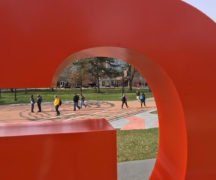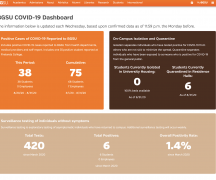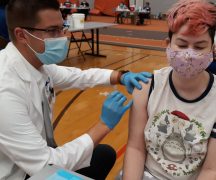By DAVID DUPONT
BG Independent News
Faculty concerns about current situation as the semester begins were aired at the first Faculty Senate meeting of the semester this week.
President Rodney Rogers said that a couple months ago they were looking at a more certain and normal situation, now they are back with a semester “like none other,” one that again will require adaptability and flexibility as the administration, faculty, students, and staff navigate through a new wave of COVID cases caused by the delta variant.
He acknowledged that no decision made pleases everyone, whether it is about wearing facial coverings or the decision to require all students, staff, and faculty to be vaccinated by the beginning of the spring semester unless they have received an exemption.
Provost Joe Whitehead said that the deans are looking at the logistics of how to deal with the increasing number of students who cannot attend class because they either have COVID-19 and are in isolation or in quarantine because they have been in contact with someone who has tested positive.
Whitehead said there is no one solution to how to make sure these students are able to keep up with their work. “We’re still working through the process.”
Whitehouse insisted all courses now offered in person will remain in person. There is flexibility for faculty to work with their department chair “to move to a different delivery mode if necessary on a temporary basis. It’s not a singular decision.”
Still, he emphasized, it has become clear students want in-person classes. “We’re trying to meet students where they are under these trying circumstances.”
The administration is also trying to address the lack of space for social distancing of a minimum of three feet. Also, he said, after being in isolation being in a crowded classroom can cause anxiety.
The registrar is working to move some larger classes to larger spaces, and which should have a ripple effect with rooms becoming available.
“We don’t have the inventory to respond to all requests,” Whitehead said.
“It’s case by case,” senate chair Christopher Frey said.
Joanna Weaver, of the School of Teaching and Learning, asked about how she could get a room changed. The room she is assigned cannot hold the 32 students on her roster and maintain three-foot distancing.
There was a positive case in her classroom and she and the other students needed to quarantine and get tested. Given she is immune-compromised this is a particular concern. She fortunately tested negative.
Whitehead said there is a list being made of requested changes, but first the larger classes must be moved to non-conventional spaces to free up classroom space.
Chief Health Officer Ben Batey said that exposure within a classroom would not automatically result in contact tracing. If the contact had three-feet distance, was masked, and it was under 15 minutes, no follow up is necessary. However, he conceded, health officials are at the mercy of those who test positive to give as much and as accurate information as possible.
Now, he said, it’s harder than last year when everything was closed down. It’s harder to do contact tracing when someone can go to a bar, a concert, or sports event with hundreds of other people. That’s why people need to be monitoring their own symptoms.
Batey said that there are ample opportunities for testing from the Falcon Health Center, self-testing kits, and university testing.
The university is not currently doing surveillance testing, he said. Carving out a group to test is more difficult because of vaccinations. Instead the university will strategically going where there is an increase in cases whether it is in an organization or residence hall. That’s a better approach, he said, than randomized testing.
Brent Archer, of the Department of Communication Sciences and Disorders, expressed surprise that the university is not doing surveillance testing as is being done at BGSU’s sister institutions. “How confident are you that the very low number on the dashboard is an actual reflection in any meaningful way of cases at BGSU?”
“We’re using strategy for positive open ended testing,” Batey said.
He also noted that those lower numbers would change when the dashboard was updated. “We’re certainly seeing those cases.”
He is in daily contact with Wood County Hospital and Falcon Health Center to monitor the number of cases, and the county is doing some wastewater testing.
“I think we have more widespread testing available than at any point. Any student, faculty or even family can be tested at any time,” he said. The randomized testing “didn’t net us very much last semester.”
All that testing “gives us a very accurate view of what’s going on on campus,” he maintained.
Batey also addressed the process by which people can get an exemption from being vaccinated. That will be rolled out soon, he said.
The most concern is with the personal conscience exemption. For medical exemptions the university would turn to medical professionals. For the religious exemption, they would seek guidance from religious leaders.
Personal conscience is more difficult, Batey said. “For personal conscience we may be looking for a pretty detailed reason. … Not knowing what reasons we want to keep it pretty open. So we’re not asking initially to provide supporting documents. We will seek that out as needed.”
Frey noted that some people have asked for examples of reasons should be posted, but as has happened elsewhere, applicants then just copy those reasons.
The reason, Frey said, should be “long standing and documented.”
A family that has never been vaccinated would indicated they have a long-held belief, Batey said. “We’re trying to engaged the community.”
The process will help for him to know the extent of vaccination on campus.





